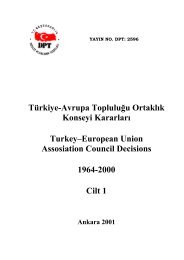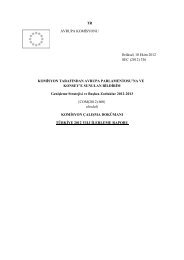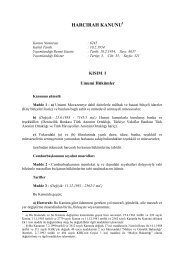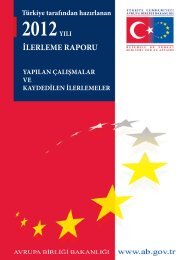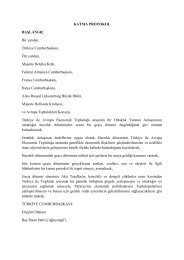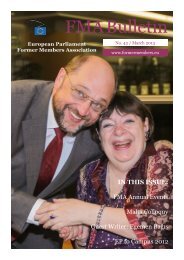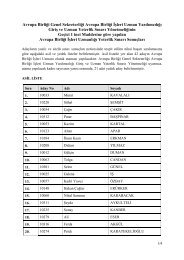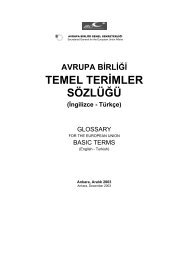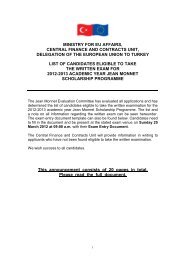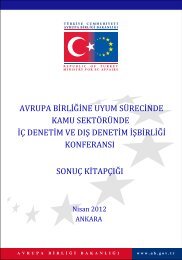2010 ilerleme raporu - Avrupa BirliÄi BakanlıÄı
2010 ilerleme raporu - Avrupa BirliÄi BakanlıÄı
2010 ilerleme raporu - Avrupa BirliÄi BakanlıÄı
You also want an ePaper? Increase the reach of your titles
YUMPU automatically turns print PDFs into web optimized ePapers that Google loves.
institutions, labour unions and the Turkish Union of Chambers and Stock Exchanges (TOBB)<br />
to form further anti-corruption strategies and to direct and monitor their implementation.<br />
The strategy aims at developing preventive and repressive measures against corruption and<br />
improving public governance by introducing more transparency, accountability and reliability<br />
in the public administration.<br />
An action plan setting the timetables for adoption and implementation of each measure was<br />
approved by the ministerial committee in April <strong>2010</strong>. Effective implementation could<br />
contribute to changing behaviour of public administration, so that it promotes and protects<br />
integrity and reduces opportunities for corrupt practices. However, participation by civil<br />
society and its role on the executive board and in implementation of the strategy need to be<br />
strengthened.<br />
By June <strong>2010</strong>, Turkey had implemented 15 of the 21 recommendations in the 2005 evaluation<br />
reports by the Group of States against Corruption (GRECO). The GRECO report suggests<br />
further efforts, in particular to broaden the representation of the anti-corruption oversight<br />
body, to enhance the independence of the judiciary and, to reform the system of immunities<br />
and to finally establish the Ombudsman institution. The constitutional amendments provide<br />
the basis for progress on enhancing the independence of the judiciary and an Ombudsman<br />
institution.<br />
In December 2009, the Prime Ministerial Inspection Board was appointed as the counterpart<br />
of the European Anti-Fraud Office (OLAF) and was given the task of Anti-Fraud<br />
Coordination Structure (AFCOS) responsible for investigation of irregularities in the context<br />
of financial cooperation between the EU and Turkey. (See Chapter 32 – Financial control)<br />
In February <strong>2010</strong>, the Constitutional Court annulled the provisions of the Law on the Council<br />
of Ethics regarding publication of the names of civil servants who violate the code of ethics,<br />
on the grounds that publishing names without a judicial decision would jeopardise the<br />
presumption of innocence. Ethics training has continued and around 7,000 civil servants<br />
working for central and local governments have been trained between October 2009 and<br />
September <strong>2010</strong>. In September, the Government adopted a regulation on the code of ethics<br />
with which investigators and auditors should comply while doing their jobs. However, no<br />
progress has been made on extending ethics rules to academics, military personnel and the<br />
judiciary.<br />
No progress has been made on limiting the immunities of Members of Parliament concerning<br />
corruption-related offences.<br />
Further measures are needed to complete the existing legislation and ensure its effective<br />
implementation to increase transparency on the financing of political parties and election<br />
campaigns. More resources are also required in order to better detect illegal practice, in<br />
particular to extend the current monitoring mechanism to election campaign funding of parties<br />
and candidates.<br />
For the first time, a mayor of a metropolitan municipality (Adana) was suspended from<br />
mayoral duties on March <strong>2010</strong> by the Ministry of Interior because of serious corruption<br />
allegations. Administrative and judicial investigations are continuing.<br />
EN 15 EN




